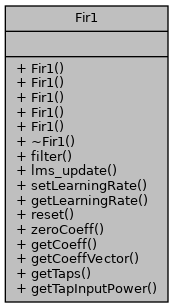#include <Fir1.h>

Public Member Functions | |
| template<unsigned nTaps> | |
| Fir1 (const double(&_coefficients)[nTaps]) | |
| Fir1 (std::vector< double > _coefficients) | |
| Fir1 (double *coefficients, unsigned number_of_taps) | |
| Fir1 (const char *coeffFile, unsigned number_of_taps=0) | |
| Fir1 (unsigned number_of_taps) | |
| ~Fir1 () | |
| double | filter (double input) |
| void | lms_update (double error) |
| void | setLearningRate (double _mu) |
| double | getLearningRate () |
| void | reset () |
| void | zeroCoeff () |
| void | getCoeff (double *coeff_data, unsigned number_of_taps) const |
| std::vector< double > | getCoeffVector () const |
| unsigned | getTaps () |
| double | getTapInputPower () |
Detailed Description
Finite impulse response filter. The precision is double. It takes as an input a file with coefficients or an double array.
Constructor & Destructor Documentation
◆ Fir1() [1/5]
|
inline |
Coefficients as a const double array. Because the array is const the number of taps is identical to the length of the array.
- Parameters
-
_coefficients A const double array with the impulse response.
◆ Fir1() [2/5]
|
inline |
Coefficients as a C++ vector
- Parameters
-
_coefficients is a Vector of doubles.
◆ Fir1() [3/5]
| Fir1::Fir1 | ( | double * | _coefficients, |
| unsigned | number_of_taps | ||
| ) |
Coefficients as a (non-constant-) double array where the length needs to be specified.
- Parameters
-
coefficients Coefficients as double array. number_of_taps Number of taps (needs to match the number of coefficients
Initialise the filter from coefficients, assigned as array
- Parameters
-
_coefficients coeffs to be assigned number_of_taps nr of taps (array length)
◆ Fir1() [4/5]
| Fir1::Fir1 | ( | const char * | coeffFile, |
| unsigned | number_of_taps = 0 |
||
| ) |
Coefficients as a text file (for example from Python) The number of taps is automatically detected when the taps are kept zero.
- Parameters
-
coeffFile Patht to textfile where every line contains one coefficient number_of_taps Number of taps (0 = autodetect)
Initialise the filter coefficients with a text file where each line is has one coefficient
- Parameters
-
coeffFile text file for initialisation number_of_taps nr of fiter taps (order)
◆ Fir1() [5/5]
| Fir1::Fir1 | ( | unsigned | number_of_taps | ) |
Inits all coefficients and the buffer to zero
This is useful for adaptive filters where we start with zero valued coefficients.
Initalise the filter with empty coefficients
- Parameters
-
number_of_taps nr of taps (filter order)
◆ ~Fir1()
| Fir1::~Fir1 | ( | ) |
Releases the coefficients and buffer.
Filter destructor
Member Function Documentation
◆ filter()
|
inline |
The actual filter function operation: it receives one sample and returns one sample.
- Parameters
-
input The input sample.
◆ getCoeff()
| void Fir1::getCoeff | ( | double * | coeff_data, |
| unsigned | number_of_taps | ||
| ) | const |
Copies the current filter coefficients into a provided array. Useful after an adaptive filter has been trained to query the result of its training.
- Parameters
-
coeff_data target where coefficients are copied number_of_taps number of doubles to be copied
- Exceptions
-
std::out_of_range number_of_taps is less the actual number of taps.
Copies a coeffs to coeff_data array
- Parameters
-
coeff_data number_of_taps
◆ getCoeffVector()
|
inline |
Returns the coefficients as a vector
◆ getLearningRate()
|
inline |
Getting the learning rate for the adaptive filter.
◆ getTapInputPower()
|
inline |
Returns the power of the of the buffer content:
sum_k buffer[k]^2 which is needed to implement a normalised LMS algorithm.
◆ getTaps()
|
inline |
Returns the number of taps.
◆ lms_update()
|
inline |
LMS adaptive filter weight update:
Every filter coefficient is updated with: w_k(n+1) = w_k(n) + learning_rate * buffer_k(n) * error(n)
- Parameters
-
error Is the term error(n), the error which adjusts the FIR conefficients.
◆ reset()
| void Fir1::reset | ( | ) |
Resets the buffer (but not the coefficients)
sets all tap outputs to zero
◆ setLearningRate()
|
inline |
Setting the learning rate for the adaptive filter.
- Parameters
-
_mu The learning rate (i.e. rate of the change by the error signal)
◆ zeroCoeff()
| void Fir1::zeroCoeff | ( | ) |
Sets all coefficients to zero
Sets all coeffs to zero
The documentation for this class was generated from the following files:
 1.8.17
1.8.17